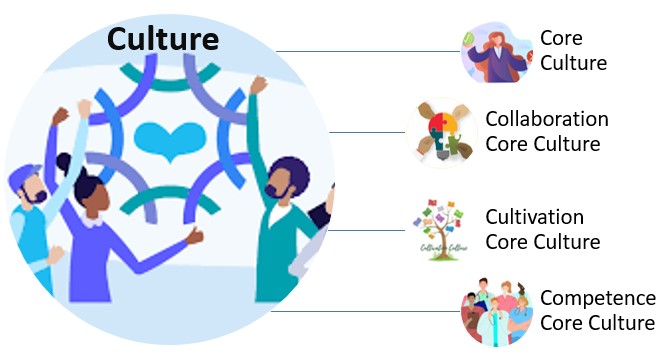Culture in a workplace refers to a mix of assumptions, beliefs, values, norms, and tangible signs associated with employees and their behaviours. Studies reveal the fact that culture is a powerful element in the workplace and it is multidimensional. It significantly creates an impact on the skills and competencies of the leaders and can either positively or adversely impact their ability to successfully execute innovative projects. A strong culture in innovative projects generate commitment toward the organisational values and act as a mean by which organisations can improve their performance levels. It further provides an environment for adopting changes in projects while increasing the chances of survival and maintaining a competitive advantage. Culture acts as a core factor in project success along with other factors such as the organisational design or team structure, project processes, project performance management, and project management competencies. Furthermore, the culture and structure of the organisation significantly affect the management and execution phases of the project. If the organisational culture does not support innovative project management policies and project execution practices they can suffer through delays and conflicts.
The four core cultures in the context of managing projects as highlighted in literature can be identified as control core culture, competence core culture, collaboration core culture, and cultivation core culture. Each typology of culture listed has its own merits and demerits and a critical analysis of each typology to identify the best fit for innovative projects is the purpose of this article.

Core Culture
The control core culture can be designated as a militaristic model since key features are related to the development of efficient planning tactics, building systems, policies, and procedures, creating orders, clarifying roles and clarifying roles. However, this cultural orientation in a project management environment might result in intensive work environments and suppression of ideas from the lower management and cannot be held worthwhile for innovative projects.
Collaboration Core Culture
The collaboration core culture can be designated as a synergy-based model and focuses on unity and close connections between project stakeholders. The core strength of this model lies in its ability to develop and manage diversities in a project and open communications that support relationships between the project team and treat one another in a sensitive and caring manner. Still, the critiques argue that this model may become over-compromising and might fail to recognise individual achievements which is a crucial need in innovative projects.
Cultivation Core Culture
The Cultivation core culture stresses meaningfulness and actualisation and pays specific attention to beliefs, aspirations and inspirations. The strength of this culture lies in the fact that it makes people feel more cared for and nurtured. It further encourages commitment and dedication and it is open to change. However, it can result in project delays and is highly vulnerable to inefficiencies and playing favourites, therefore, innovative projects and cultivation core culture cannot be termed as a strategic fit for each other.
Competence Core Culture
A competence core culture highly emphasises project quality and gaining uniqueness for being a quality-focused organisation. The key merits of this cultural orientation can be identified as the high-performance standards, high levels of technical expertise, and establishment of creative and exciting workplaces. However, focusing on these factors in urgent and time-constrained innovative projects may result in certain drawbacks in terms of high pressure on employees since the performance standards are high and this can ultimately result in under performance from the end of employees. In the meantime, if the innovative projects are treated with patience, it can be argued that the competence core culture can be justified as the best cultural orientation since innovative projects require high levels of technical competencies and quality and they need to be completed with high levels of quality and with an intention of sustainability of transformations in future.
Author Info
MAZHAR ALI

The author is currently employed as an Operational Excellence Lead at Al Karam Textile Mills Pakistan. He is a postgraduate from the Department of Industrial Engineering, University of Engineering and Technology, Taxila, Pakistan where he received his bachelor’s in 2017. He is the author of a couple of journal articles along with some conference papers. His research interests include engineering management, project management, optimization techniques, and project scheduling and algorithms.